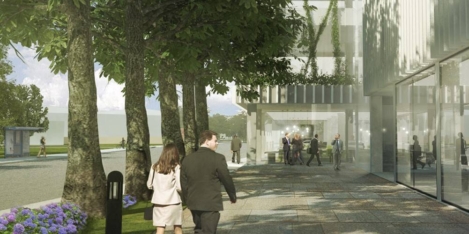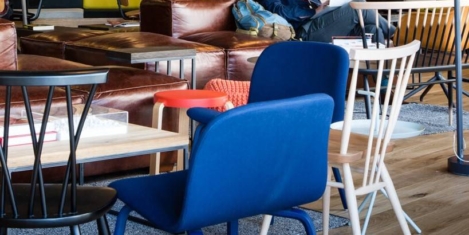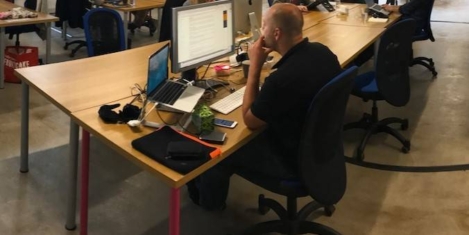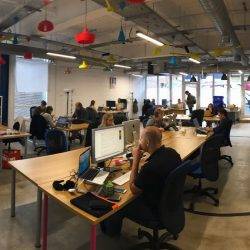To provide the best experiences, we use technologies like cookies to store and/or access device information. Consenting to these technologies will allow us to process data such as browsing behaviour or unique IDs on this site. Not consenting or withdrawing consent, may adversely affect certain features and functions.
The technical storage or access is strictly necessary for the legitimate purpose of enabling the use of a specific service explicitly requested by the subscriber or user, or for the sole purpose of carrying out the transmission of a communication over an electronic communications network.
The technical storage or access is necessary for the legitimate purpose of storing preferences that are not requested by the subscriber or user.
The technical storage or access that is used exclusively for statistical purposes.
The technical storage or access that is used exclusively for anonymous statistical purposes. Without a subpoena, voluntary compliance on the part of your Internet Service Provider, or additional records from a third party, information stored or retrieved for this purpose alone cannot usually be used to identify you.
The technical storage or access is required to create user profiles to send advertising, or to track the user on a website or across several websites for similar marketing purposes.
 Almost half of UK workers (47 percent) spend the majority of their time feeling overwhelmed by their workloads, while 85 percent say that work is causing them stress, according to research from employee experience business Qualtrics. The Qualtrics Employee Pulse is a quarterly survey of more than 4,000 employees which claims to highlight the impact of burgeoning workloads on today’s workforce and reveals better support from businesses is needed to ensure the mental wellbeing of staff.
Almost half of UK workers (47 percent) spend the majority of their time feeling overwhelmed by their workloads, while 85 percent say that work is causing them stress, according to research from employee experience business Qualtrics. The Qualtrics Employee Pulse is a quarterly survey of more than 4,000 employees which claims to highlight the impact of burgeoning workloads on today’s workforce and reveals better support from businesses is needed to ensure the mental wellbeing of staff.
















 The UK has been ranked as the eighth best country in the world for the ability to attract, retain, train and educate skilled workers, but while its ability to leverage diversity for talent competitiveness is boosted by its global knowledge skills – the UK is undermined by its weaker performance on tolerance and gender equality. According to the Global Talent Competitiveness Index GTCI) produced by the Adecco Group, with international business school INSEAD and Tata Communications, the UK has a particularly strong pool of global knowledge skills, a variable for which it is ranked third in the index boosted further by its strong regulatory, market and business landscape. But this is undermined by its internal openness, where it still lags behind, especially when it comes to gender equality. The report also suggests that although Article 50 was triggered in 2017, the ongoing negotiations and continuing lack of clarity over the UK’s position once it leaves the European Union in 2019, means the impact of Brexit is not yet clear.
The UK has been ranked as the eighth best country in the world for the ability to attract, retain, train and educate skilled workers, but while its ability to leverage diversity for talent competitiveness is boosted by its global knowledge skills – the UK is undermined by its weaker performance on tolerance and gender equality. According to the Global Talent Competitiveness Index GTCI) produced by the Adecco Group, with international business school INSEAD and Tata Communications, the UK has a particularly strong pool of global knowledge skills, a variable for which it is ranked third in the index boosted further by its strong regulatory, market and business landscape. But this is undermined by its internal openness, where it still lags behind, especially when it comes to gender equality. The report also suggests that although Article 50 was triggered in 2017, the ongoing negotiations and continuing lack of clarity over the UK’s position once it leaves the European Union in 2019, means the impact of Brexit is not yet clear.






 Half of SMEs (50 percent) questioned in a new survey have changed the way that they recruit their staff as a result of Brexit. The Albion Growth Report 2017 of more than 1,000 SMEs suggests that for businesses which have changed their strategy as a result of Brexit, 15 percent have decreased recruitment resources, 10 percent have begun recruiting in different ways and 9 percent have made redundancies. A difficulty in finding skilled staff is one of the biggest barriers to growth, behind broader political uncertainty and cash flow, which the research claims could lead to a potential war for talent which is likely to become more intense in the post-Brexit environment. By contrast, SMEs view difficulty in finding unskilled staff as the least significant barrier to growth. The report finds that nearly two thirds (65 percent) of SMEs believe their business lacks expertise. More than a quarter (26 percent) of businesses lack marketing talent, followed by business planning (19 percent), IT (17 percent), and software developers and technology specialists (17 percent). Despite critical skills deficits, only a third of SMEs (33 percent) are currently hiring new employees.
Half of SMEs (50 percent) questioned in a new survey have changed the way that they recruit their staff as a result of Brexit. The Albion Growth Report 2017 of more than 1,000 SMEs suggests that for businesses which have changed their strategy as a result of Brexit, 15 percent have decreased recruitment resources, 10 percent have begun recruiting in different ways and 9 percent have made redundancies. A difficulty in finding skilled staff is one of the biggest barriers to growth, behind broader political uncertainty and cash flow, which the research claims could lead to a potential war for talent which is likely to become more intense in the post-Brexit environment. By contrast, SMEs view difficulty in finding unskilled staff as the least significant barrier to growth. The report finds that nearly two thirds (65 percent) of SMEs believe their business lacks expertise. More than a quarter (26 percent) of businesses lack marketing talent, followed by business planning (19 percent), IT (17 percent), and software developers and technology specialists (17 percent). Despite critical skills deficits, only a third of SMEs (33 percent) are currently hiring new employees.










February 12, 2018
Luther, Marx, Engels and a nailed-on manifesto for workplace change
by Mark Eltringham • Comment, Facilities management, Workplace design
(more…)